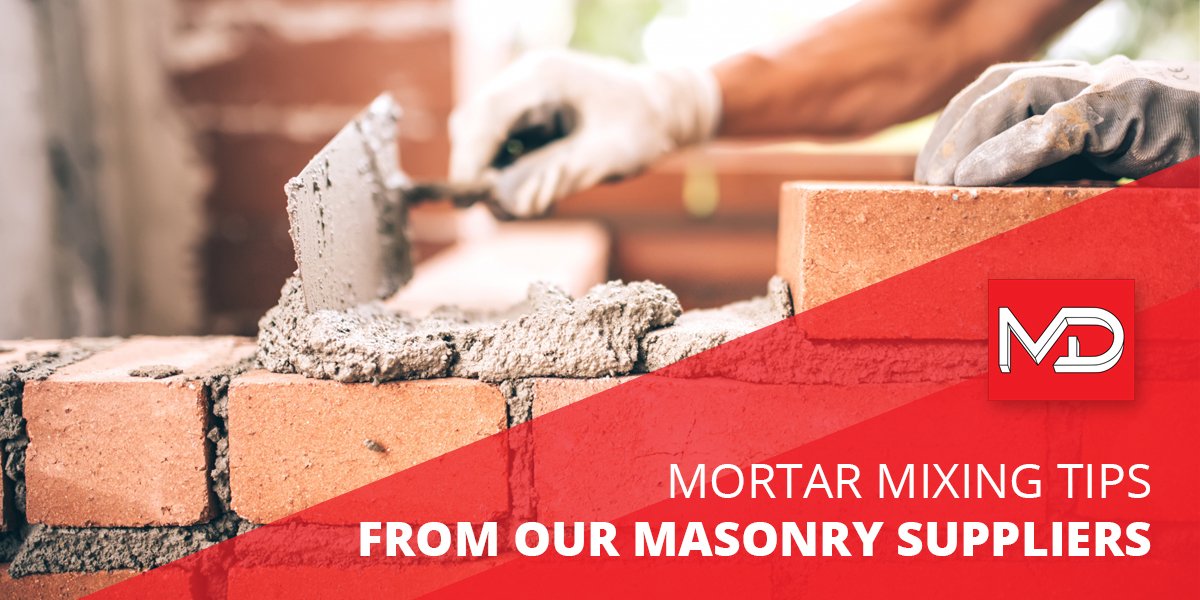
Mortar Mixing Tips From Our Masonry Suppliers

On a typical jobsite, you’ll find masonry contractors hard at work installing bricks and concrete masonry units (CMUs). It is vital for these professionals to deploy the best building materials and techniques available to deliver long-lasting quality and protection. One area that can create considerable variation in the strength and beauty of your building’s masonry is the mortar used to bond together blocks, stones, and bricks. Today, we’ll highlight a few mortar mixing tips to provide you with a refresher on proper protocol and planning.
Masonry Direct is proud to be your online provider of masonry supplies and construction equipment to outfit crews in need. We’re confident that we can provide all of the material you need to complete your next masonry project. Shop online when you’re finished reading our post, or contact us online for assistance!
Utilize PPE
It can be too easy to forget your gloves, mask, or eye protection on the jobsite. However, the importance of safety cannot be understated, especially when it comes to working with fines and aggregates known to cause eye and lung irritation. Be sure to always rely on the proper personal protective equipment (PPE) needed to mix mortar. Failure to abide by safety guidelines or jobsite regulations can result in fines, disciplinary action, and more.
Instead of risking it, Masonry Direct suggests you stock up on the safety equipment needed to get the job done. Our online masonry supply store provides gloves, eyewear, and respirator masks at affordable prices.
Focus on Workability
It is important to retain a good mixture for your mortar, as a slump that is too wet or too dry can impact the cure time and strength of the system. You can add more water to your mortar if it starts to dry, but be sure to pay attention to the characteristics of your mixture. Once the mortar begins to set, added water will only damage the material and impact the curing process.
Masonry contractors often rely on mortar additives such as plasticizers to increase workability in needed applications. If you’re looking for additives, be sure to find them in our online shop, and be sure to reach out our construction suppliers for assistance!
Watch Out For Environmental Factors
While the sand placed in your mortar mixer will typically yield a moisture content between 3% and 7%, environmental factors such as rain or spills can result in some variability. Be sure to cover your sand when not in use to keep it dry, as excess moisture can hamper your mixture!
Also be sure to periodically check your sand, as clay and other contaminants can impact the stability of your mixture!
Remember Your Ratios
Mortar mixtures will tend to be measured by volume, relying on specific ratios to deliver a predetermined level of strength and workability. Keep in mind that different mixtures will require differing ratios of materials, and be sure to utilize the correct measurements for your specific application.
Mortar mixtures come in different types to meet building specifications. While your Type N mortar provides a nice balance of Portland cement and hydrated lime, Type M provides considerably more cement while Type O focuses on heavier amounts of lime. Check your specifications, and be sure to browse our online store to find the right mortar mix!
Consistency is King
In order to get into the groove of things, your masonry team will need to develop a consistent method of mixing and application. Individuals that deploy different mixing techniques and material amounts will create a unique batch, impacting the consistency of your work. Take the time to refine your mortar mixing and laying procedures, implementing tools to help create measured success.
Remember Your Time Limits
Like Portland cement mixtures, mortar provides a 90-minute window for usability. Once this time period has elapsed, most builders will be required to discard the mixture, as it will begin to see decreases in strength and fluidity. Keep your eye on the time, and keep in mind that higher heats and direct sunshine may reduce this time period.
Watch the Weather
Colorado is known for its rapid temperature changes, which can make life hard when it comes to construction. Most masonry contractors will keep a close eye on the weather hourly to ensure they are prepared in case rain arrives. If the weather is warm, a slight rain or drizzle can actually prove beneficial for your mortar. Excess rain, though, will likely wash the lime out and weaken your mixture!

Need Masonry Supplies?
Masonry Direct of Denver is here to provide the best supplies and service to contractors and DIYers across the country. Our online masonry supply store provides all of the materials you need at affordable prices, including our mortar mixtures, mortar and concrete mixers, and more.
Contact us today if you have any questions, and be sure to browse our online store to find the products you need!
